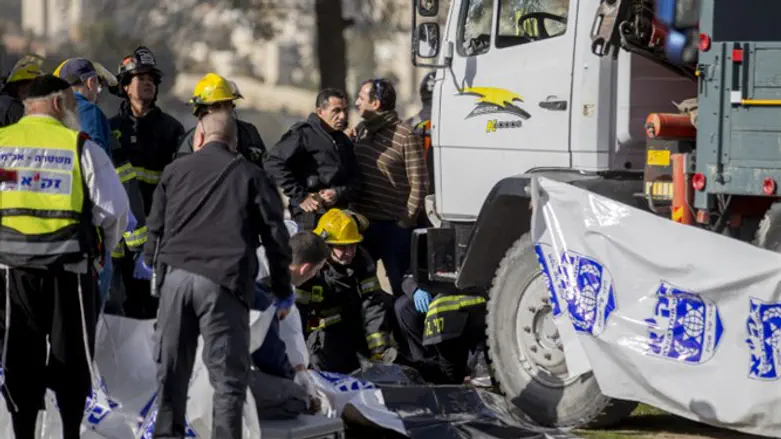
She praised him. Praised and lauded him, not despite but because he had sacrificed his life to murder four Israeli Jews and wound roughly a dozen more.
The sister of the terrorist responsible for Sunday’s murderous terror attack involving a trailer truck is, like her brother, from the predominantly Arab neighborhood of Jabel Mukaber in southeast Jerusalem.
For those in Israel’s security establishment, expressions of support for the terrorist’s murderous deeds, seen in the memorial tent established – torn down, then reestablished – by the killer’s family and many spontaneous acts of celebration are hardly surprising.
Jabel Mukaber has long been familiar to residents of the capital and to security officials as a haven for the most extreme forms of anti-Semitism, hatred of the State of Israel, and incitement to violence, all of which have only increased in the past few years.
The residents of Jabel Mukaber, like all other Arab residents of the capital, benefit from the rights extended by Israeli democracy, and enjoy full freedom of movement with their Israeli ID cards, and are able to convert their residency status to full citizenship, if desired. They frequent Israeli malls, shopping centers, and parks anywhere in the country unmolested.
Despite their freedoms, however, the neighborhood is fast becoming a foothold for the ISIS terror organization, giving the international Islamic movement a backdoor into the Jewish state, which hitherto largely succeeded in combating efforts by ISIS to recruit in Israel.
As Israeli security forces, including Jerusalem police, have monitored recently, Jabel Mukaber has not merely grown more hospitable to anti-Israel hatred – always a widespread phenomenon in the neighborhood – but has shown a more general cultural shift towards the jihad ideology espoused by ISIS.
Two years ago, for instance, veteran journalist Avi Issacharoff reported on how local children were being inculcated with pro-jihadist messages. Eight and nine year old boys, he reported, were already declaring their intention to become “martyrs”.
Sunday’s deadly truck attack was, in its essence, nothing new. The terrorist driver drew inspiration from a string of recent car attacks by ISIS terrorists across Europe, most notably the Christmas market massacre in Berlin, and the slaughter of some 86 pedestrians in Nice, France. In the US, an Ohio State University student originally from Somalia also used his car as a terror weapon, running down students before stabbing others. And of course, during the terror wave in Israel beginning in September 2015, numerous attacks against Jews used trucks, tractors, or cars to run down hapless victims.
In the wake of the attack, authorities are only taking limited steps to maintain law and order in Jabel Mukaber. This morning police shut down the main thoroughfare in the neighborhood – but only after locals rioted and shot fireworks at police deployed in the nearby Armon Hanatziv neighborhood, where the attack took place.
A proper response to Sunday’s attack would have included the immediate demolition of the terrorist’s home and the deportation of his family to Gaza. In addition, police must arrest rioters, and track down and punish all those who celebrated the attack or handed out candy to jubilant residents.
In the meantime terrorism runs wild on social media outlets and, to some extent emanates from them. In that regard, law enforcement officials seem quickest to target Jews – while turning a blind eye to the sea of anti-Jewish incitement in the Arab sector. Anyone who makes a foolish comment on Facebook against the IDF Chief of Staff or some Arab figure is liable to find himself behind bars, while most Arab inciters freely spread their hate.
We have missed enough opportunities to deal with Jabel Mukaber, the incubator of murderous terrorism in the heart of Jerusalem, which brought us the massacre in the Merkaz Harav Yeshiva in 2008 which left eight dead, the butchering of worshippers in the Har Nof synagogue in 2014, Sunday’s truck attack, and numerous other acts of terror.
If we miss this opportunity to finally confront the villainy emanating from Jabel Mukaber, we will no doubt pay for it with more blood.

